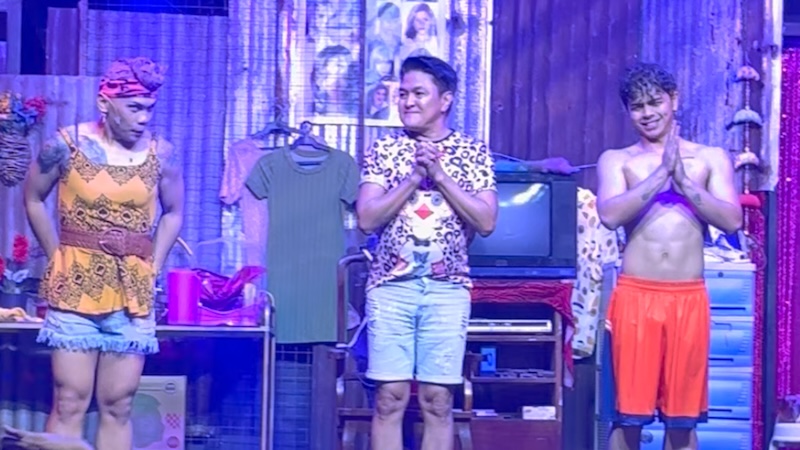
REVIEW: ‘Ateng’ is a dark comedy of queer survival
Vincent A. DeJesus’ Ateng returns to the stage twenty years after its Virgin Labfest debut, positioned as a period piece meant to look back on queer life in the mid-2000s. But what emerges in this Rem Zamora–directed revival—now staged at Rampa Drag Club—is less a time capsule and more a pointed reminder of how little has changed for many queer Filipinos living on the margins.
The production aims to show audiences “how things were” in 2005: a dog-eat-dog world for gay men with limited resources, options, or protections. Yet the material doesn’t feel distant or dated.
But more crucially, the violence, economic precarity, and cycles of abusive relationships depicted here still exist within poorer, urban communities where queerness continues to collide with machismo and homophobia. Even in an age of drag bars, social media visibility, and a wider cultural vocabulary, the Philippines still has no national law that protects LGBTQ+ people. In that context, Ateng feels less like a revival and more like an indictment of a long and ongoing stagnation.
Still, the play contains far more than nostalgia or social reflection. For all its grit and sharp-tongued comedy, Ateng is ultimately a layered portrait of queer survival—one that examines class, shame, siblinghood, and the small, scrappy victories possible for those who rarely get to win.
Tight and tense
The 60-minute one-act begins with Kiwi–nicknamed Ateng and played by DeJesus himself–tallying the mounting expenses his younger sibling, Juicy (Jason Barcial), has spent on his new paramour, Onyx (Kokoy De Santos). Ateng is frustrated with Juicy’s years of similar choices. His bisyo is falling for men, you see. Worse still, they are men who only use him for money and attention before discarding him once he’s wrung dry.
The show is largely a back and forth between the siblings, arguing Juicy’s choices, Ateng’s tough love, the bills that are going unpaid, and even debates about Madonna and Tina Turner that are, of course, not really just about Madonna and Tina Turner.
Onyx then arrives to charm his way into more favors from Juicy and Ateng’s interrogation of his intentions escalates into a darker confrontation. What starts as a comedic two-hander between panganay and bunso shifts into something closer to a thriller, culminating in a reckoning that is as morally gray as it is cathartic.
Sibling dynamics
Zamora foregrounds the panganay–bunso relationship at the heart of the play, shaping the tension around how Ateng’s bossy, harangued, frustrated energy (brought to life by DeJesus’ lived-in performance) crashes against Juicy’s feeble excuses and self-defeating patterns. The dynamic feels deeply familiar, and deeply Filipino—an older sibling exhausted by responsibilities thrust upon them, and a younger one repeating the same mistakes. The tonal balance between zinger-filled dark comedy and creeping danger is one of the production’s strongest achievements, allowing humor to crackle without softening urgency.
As Ateng, DeJesus is sharp, thorny, impatient, and deeply protective, carrying the weight of someone long forced to clean up after the world’s messes—especially Juicy’s. His portrayal makes the character’s flawed but lucid moral compass easy to track. Barcial’s Juicy, meanwhile, blends vulnerability with poor decision-making; his repeated patterns make Ateng’s exasperation feel justified without pitting them against each other. Their bond is written in the details—like Ateng’s insistence on correcting “pifty” to “fifty,” a moment that lands as both comedy and class aspiration.
De Santos’ Onyx is a convincingly smarmy, manipulative opportunist, framed as younger in a way that heightens Juicy’s naivete and the imbalance in their relationship. While Onyx initially appears to hold power as the straight-presenting, toxic-masculine figure, the story ultimately becomes about flipping that script. The production leans into how shame—particularly machismo-driven shame—can be weaponized against someone who uses it to harm others, and the moral murkiness of that reversal is what ultimately makes Ateng a compelling and well-paced show.
Hard-knock life
Ben Padero’s set design situates the siblings within the lower rungs of the socioeconomic ladder. The yero walls, mismatched furnishings, and parlor supplies make their hardships visible at a glance. However, these visual cues do not clearly anchor the story in 2005. The production attempts to nod to the era through a radio broadcasting mid-2000s headlines, but the detail is too fleeting to register as a firm time marker. Still, even without a strong period feel, the environment successfully roots the audience in the lived material reality of such kind of life.
Luis Galang’s lighting design deepens the tension, shifting darker as Onyx enters the space and further dimming during the scene in which the characters flip the power dynamic on him. Carlo Tabije’s costumes also reinforce class and characterization effectively—Juicy’s flamboyance and Onyx’s shirtless machismo both speak volumes without being overstated.
While times are changing, the violence shown in this story, the precarity, the internalized shame, the cycles of falling for men who exploit queer longing—these still exist. But what Ateng offers is a moment of reclaimed power. In a world that repeatedly strips queer people of victories, this show gives them one.
Tickets: Php 1,000.00
Show Dates: November 14, 2025 to December 7, 2025
Venue: Rampa Drag Club, Tomas Morato Extension, Quezon City
Running Time: approx. 60 minutes (no intermission)
Producers: Boy Abunda and RS Francisco
Creatives: Vincent A. DeJesus (playwright), Rem Zamora (director), Ben Padero (set design), Carlo Tabije (costume styling), Luis Galang (lighting designer and technical direction), Teresa Barrozo (sound design)
Cast: Vincent A. DeJesus, Thou Reyes, Jason Barcial, Io Balanon, Kokoy De Santos, Dyas Adarlo


Comments